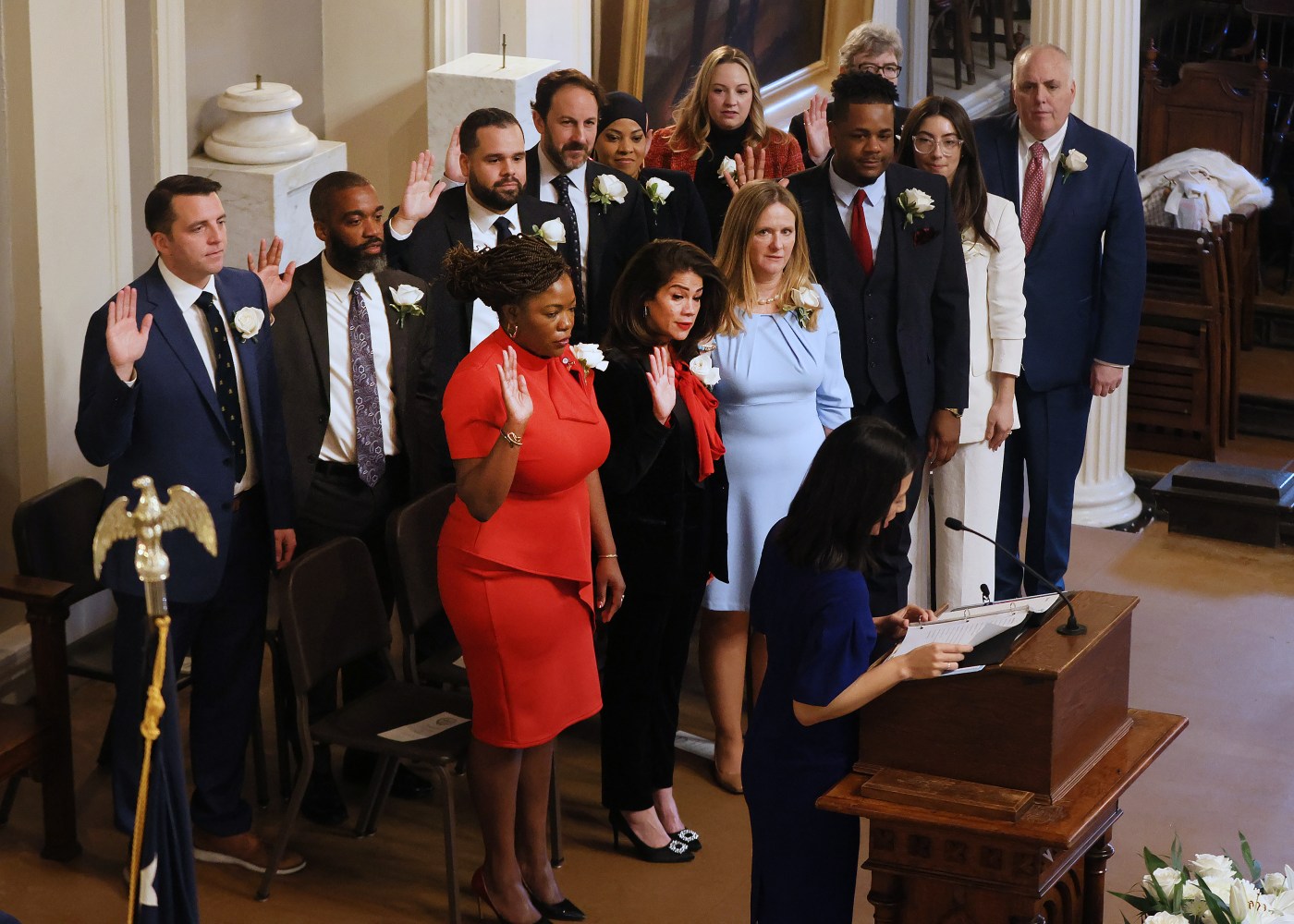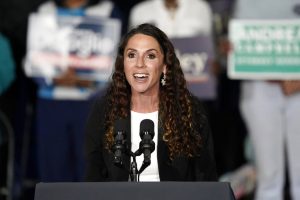
Boston Mayor Wu to put rejected anti-terror grant before City Council again
Boston Mayor Michelle Wu intends to refile a rejected $13.3 million federal counter-terrorism grant at the Jan. 24 City Council meeting, but it may be discussed among the nine affected communities at a separate meeting this week.
A Wu spokesperson said the mayor will be refiling the U.S. Department of Homeland Security grant at the “first council meeting of the year,” which, according to the body’s public calendar, takes place in two weeks.
City Council President Ruthzee Louijeune is hosting an inauguration celebration for the 13-member body, sworn into office last week, on Wednesday, and the following week includes Martin Luther King Jr. Day. The council typically never holds a regular Wednesday meeting during the week of a holiday.
The $13.3 million grant, blocked by the Boston City Council, via a 6-6 vote at a Dec. 13 meeting, may be discussed earlier, however, at a meeting of the Metro Boston Homeland Security Region, scheduled for 11:30 a.m. Thursday.
That body includes representatives from the nine communities that would split the funds: Boston, Brookline, Cambridge, Chelsea, Everett, Quincy, Revere, Somerville and Winthrop.
Boston, as chair, acts as the fiduciary, and thus is responsible for accepting the funds on behalf of the entire Metro Boston Homeland Security Region.
While a Herald review of the Jan. 25, 2023 Boston City Council meeting video showed that the same counter-terrorism grant, at $13.52 million, was unanimously approved with no discussion last year, the body voted to block the funds last month, which has prompted concern among some of the neighboring communities.
“I encourage the members of the Boston City Council to remember that they have an obligation to surrounding communities including Everett when considering the acceptance of federal grants that are intended to ensure the regional safety of residents and communities,” Everett Mayor Carlo DeMaria told the Herald.
“I support the efforts of Senator Collins and Mayor Wu to preserve accessing and use of federal funds to ensure that we are continuing to invest in preventing threats of terrorism and being prepared to respond to protect public safety and public health in a world of continuously evolving threat risks,” DeMaria said.
DeMaria is referring, in part, to a bill filed by state Sen. Nick Collins, in response to last month’s council vote, that would strip the Boston City Council of its public safety grant and public health grant approval authority.
Related Articles
Boston City Councilor deactivates X after retaking oath of office
North End restaurateurs file new lawsuit against city for ‘discriminatory treatment’ over outdoor dining
Boston Mayor Wu says city Councilor Tania Fernandes Anderson failed to take oath of office at inauguration
Boston city councilor told to retake the oath of office after viral video
Michelle Wu blames ‘racial bias’ for Claudine Gay’s downfall as Harvard president: ‘I’m just really saddened’
According to a state source, the Metro Boston Homeland Security Region can vote to take similar action at its Thursday meeting, by coming together and electing a new chair to be the receiver of federal funds.
Any of the eight other communities that make up the homeland security region would be eligible for that role, which, like it is now with Boston, would be delegated to the respective city council, the source said.
The grant represents this year’s annual funding source for the Metro Boston Homeland Security Region, half of which goes toward the eight neighboring communities, two Boston officials previously said.
The funds are awarded annually with a three-year performance period, Renee Algarin, a spokesperson for the state Executive Office of Public Safety and Security told the Herald in an email.
“These grant funds were awarded through the U.S. Department of Homeland Security’s FEMA Urban Area Security Initiative,” Algarin said. “Projects funded through the most recent grant award must be completed no later than Aug. 31, 2026, unless extended by FEMA.”
The Herald also reached out to the mayors of Quincy and Cambridge, but did not hear back prior to deadline.
The Collins bill, while responsive to a vote by the Boston City Council, would apply broadly to all city councils and boards of selectmen across the state, prompting criticism from state Sen. Lydia Edwards, who said she would be more open to a conversation about how fiduciaries should work locally.
“Maybe in general we shouldn’t have certain funds for regional purposes be allocated to only one city to hold,” Edwards, an East Boston Democrat who departed the Boston City Council in April 2022, said in a prior interview.
Edwards said the City Council provides an important check on holding city departments accountable.
Collins, however, has described the council’s recent votes as “perpetual political posturing” that “serves only to put the public’s health and safety at risk.”
At the Dec. 13 city council meeting in Boston, Ruthzee Louijeune, who was selected as the new city council president last week and voted against the grant, cited a desire for further community conversations.
City Councilor Liz Breadon, who also voted ‘no’, previously told the Herald she was seeking more information on how the grant would be used to respond to natural disasters. She said she generally supports the counter-terrorism piece, having voted for the grant in prior years.
The grant was put forward for approval following a lengthy public hearing held two days earlier.
City Councilor Erin Murphy said she anticipates another public hearing to be held prior to a new vote, citing the four new councilors who have since joined the body. She voted ‘yes’ last term, and intends to vote in favor of the grant again, she said.
“It should have passed, and it’s a shame that it’s taking so long to even get the City Council business back up and running this year,” Murphy told the Herald. “It’s necessary funds that should have passed then, so we’re going to be deep into February by the time the mayor refiles and we have a hearing on it to get more information.”
City Councilor Ed Flynn, who has also been critical of his colleagues’ vote to block the grant, repeated his call for a new vote by the end of the month, saying, “It’s not the time to play political games with the safety and security of our residents, visitors and our workforce.”


